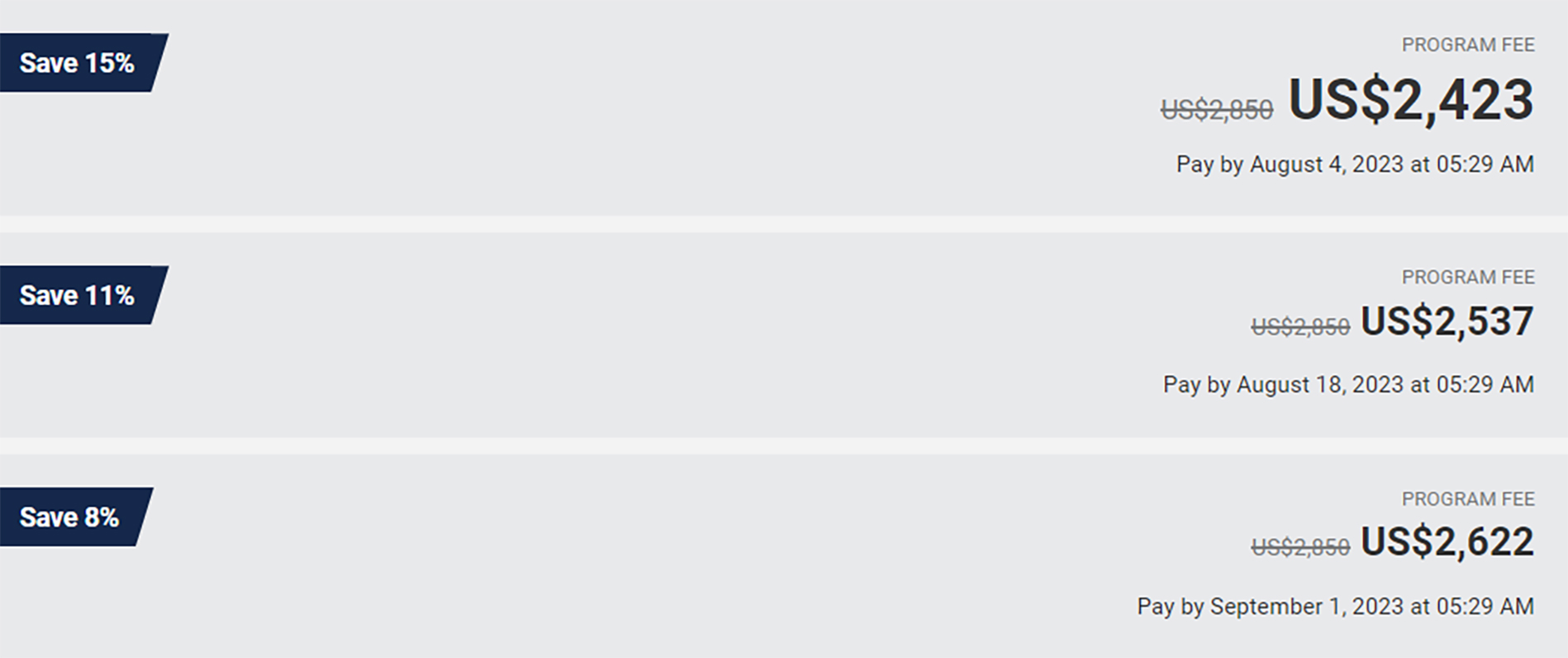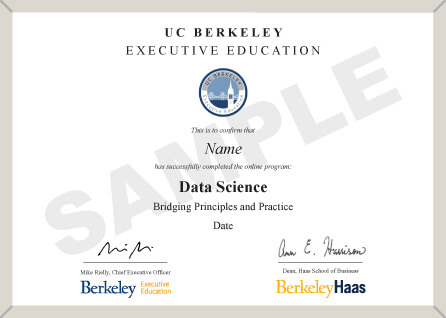

September 7, 2023
10 weeks, online
6-8 hours per week

Don’t let a data-driven organization overtake you. Become a data organization too. No matter the industry, every organization must be in the data business.
According to NewVantage Partners’ 2021 survey of senior executives, 96% said AI and big data had produced successful business outcomes, up more than 25% over the previous year. Still, only 41% say they are competing on analytics, and fewer than a quarter say their organizations have built a data-driven culture. The challenge to realizing the potential of big data lies not in the technology itself, but rather in the transformation of teams, culture, and processes.
In this program, prepare to dive right into that transformation by getting dirty in the data. Data Science: Bridging Principles and Practice provides a foundational understanding of what data science and analytics is all about. By the end of this program, you will be able to work effectively with data teams to drive successful outcomes for your organization.
In this program, you will be introduced to the basics of statistics and analytics in order to build a foundation in data science. You will acquaint yourself with the tools of analytics, explore the business applications of data concepts and tools, and develop the language and skills to work effectively with your data team. By the end of the program, you will be prepared to do the following:
This program is for mid-career managers who want to upskill, C-suite professionals that make impactful organizational decisions, and executives who want to develop their career in a fast-growing field.
While there are no formal prerequisites such as coding knowledge, having an aptitude for quantitative concepts is important.
As pre-term work and in week 1, there will be a review of basic mathematical and statistical concepts such as mean, standard deviation, graphs, histograms, and linear and logarithmic functions. In addition, there will be a weekly 'prep session' to introduce key concepts from the next module that participants may want a refresher on. To gain true literacy in data science, be prepared to get dirty in the data and embrace some math and stats. We'll fully support you along the way.
As you work through the hands-on modules, you will gain meaningful business insights from the data and example cases derived from a broad sampling of industries.
Note: In order to help you explore some of the hands-on techniques that lead directly to making better data-driven decisions, there will be two weeklong learning labs that provide an opportunity to dig deeper into the data. This extends the program to a total of 10 weeks.
During this ten-week online journey, you’ll connect directly with UC Berkeley Executive Education's faculty, industry leaders and peers from every corner of the globe. Taking a rigorous, hands-on approach, you’ll analyze data sets using Jupyter Notebook, an interactive open-source platform we will use for computational analysis. While the curriculum is pre-determined, this is an agile learning experience and there may be dynamic opportunities that present themselves based on real-world happenings.
UC Berkeley Executive Education’s faculty members have built strong relationships with industry, including many of the top organizations in and around Silicon Valley. The program's content is either inspired by or directly derived from research and applications from companies that include:



Since every company is a data company and every organization can benefit from improving its data literacy, we will explore examples from a range of industries, including:



"It was the right level of difficulty and fun to learn some basic Python."
"The notebooks were great because they were practical."
“The examples and exercises helped me put theory and practice together in a fun way.”
"The math is the core for data science and gives the proper understanding of the mechanics."
"It offered a simple transition into coding for a novice."
"I really enjoyed the mix of media, from lectures to videos to notebooks – a nice way to blend the learning."
"The Jupyter Notebook assignments and problem sets were great – nothing like getting your hands dirty, translating lectures into action."
"Easy to follow for a statistics/Python novice."
"I was looking for a data science class designed for business people, focused more on the real world. And this course delivered exactly what I was looking for."

An expert in e-commerce and the economics of the internet, Prof. Tadelis has extensive experience in the field, including a position as senior director and distinguished economist at eBay (2011–13) and vice president of economics and market design at Amazon (2016–17)...More info

Former chair of the department of economics and faculty director of the Experimental Social Science Lab (Xlab), Prof. Kariv is an expert in behavioral and experimental economics, focused on individuals’ financial and non-financial decisions...More info
Enrolling in the Data Science (Online) program can become your first step toward pursuing the UC Berkeley Executive Education Certificate of Business Excellence (COBE). The Certificate of Business Excellence gives individuals the opportunity to acquire and hone new skills and do it on a timeline that works with your busy schedule. Participants will earn a mark of distinction with certification from a world-class university, and enjoy the flexibility of completing the program in up to three years.
Learn more about the program and associated alumni benefits here.
Note: All benefits subject to change.

Get recognized! Upon successful completion of the program, UC Berkeley Executive Education grants a verified digital certificate of completion to participants. Participants must complete 80 percent of the required activities including a capstone project (if any) to obtain the certificate of completion. This program also counts toward a Certificate of Business Excellence.
EARN CERTIFICATENote: This program results in a digital certificate of completion and is not eligible for degree credit/CEUs. After successful completion of the program, your verified digital certificate will be emailed to you in the name you used when registering for the program. All certificate images are for illustrative purposes only and may be subject to change at the discretion of UC Berkeley Executive Education.

This program counts toward a Certificate of Business Excellence
A UC Berkeley Certificate of Business Excellence gives individuals the opportunity to create a personal plan of study structured by our four academic pillars. Participants will earn a mark of distinction with certification from a world-class university, and enjoy the flexibility of completing the program in up to three years.
Learn moreFlexible payment options available. Learn more